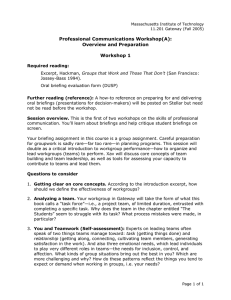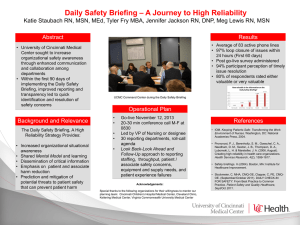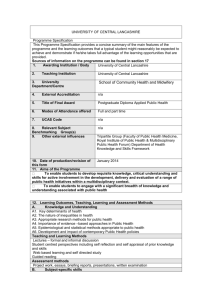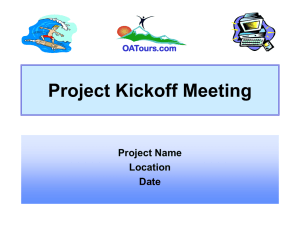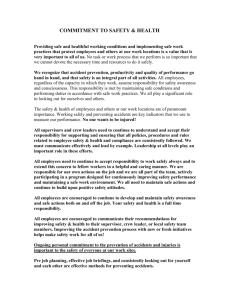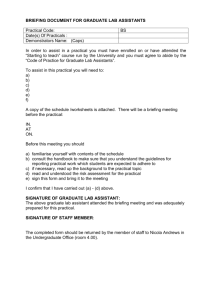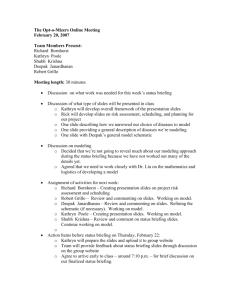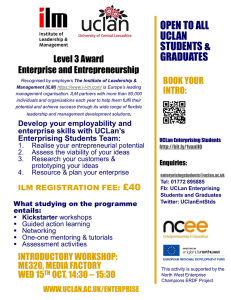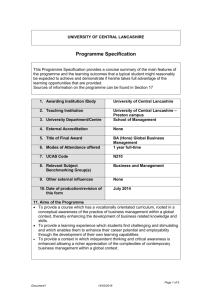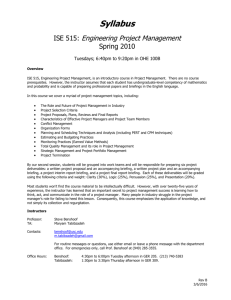Cert Environmental Legislation and Policy for Waste Management
advertisement
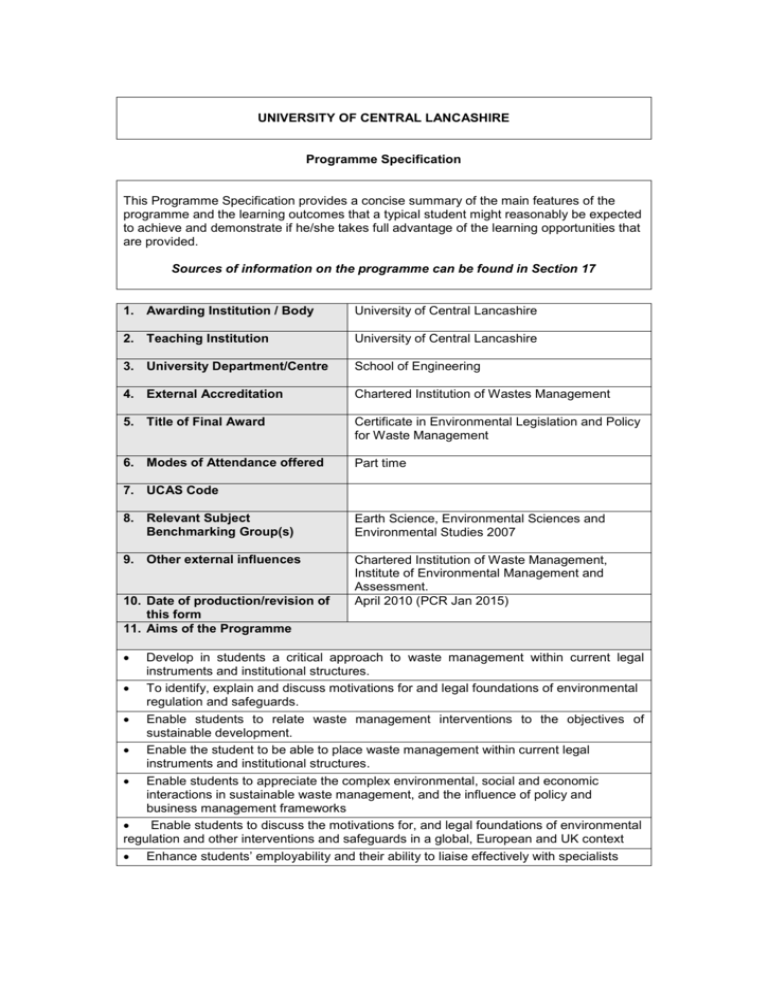
UNIVERSITY OF CENTRAL LANCASHIRE Programme Specification This Programme Specification provides a concise summary of the main features of the programme and the learning outcomes that a typical student might reasonably be expected to achieve and demonstrate if he/she takes full advantage of the learning opportunities that are provided. Sources of information on the programme can be found in Section 17 1. Awarding Institution / Body University of Central Lancashire 2. Teaching Institution University of Central Lancashire 3. University Department/Centre School of Engineering 4. External Accreditation Chartered Institution of Wastes Management 5. Title of Final Award Certificate in Environmental Legislation and Policy for Waste Management 6. Modes of Attendance offered Part time 7. UCAS Code 8. Relevant Subject Benchmarking Group(s) Earth Science, Environmental Sciences and Environmental Studies 2007 9. Other external influences Chartered Institution of Waste Management, Institute of Environmental Management and Assessment. April 2010 (PCR Jan 2015) 10. Date of production/revision of this form 11. Aims of the Programme Develop in students a critical approach to waste management within current legal instruments and institutional structures. To identify, explain and discuss motivations for and legal foundations of environmental regulation and safeguards. Enable students to relate waste management interventions to the objectives of sustainable development. Enable the student to be able to place waste management within current legal instruments and institutional structures. Enable students to appreciate the complex environmental, social and economic interactions in sustainable waste management, and the influence of policy and business management frameworks Enable students to discuss the motivations for, and legal foundations of environmental regulation and other interventions and safeguards in a global, European and UK context Enhance students’ employability and their ability to liaise effectively with specialists 12. Learning Outcomes, Teaching, Learning and Assessment Methods A. Knowledge and Understanding Students will be able to: A1 Examine and analyse the problems associated with the implementation and enforcement of environmental regulations that apply to waste, and with the implementation of environmental policies, strategies and rhetorical goals. A2 Compare and scrutinise how European directives and other key legislation and associated regulations apply to waste related activity in the UK A3 Review and assess the effectiveness of environmental and other safeguards that apply to waste management Teaching and Learning Methods Teaching will be through lectures, with learning augmented and reinforced by case studies, seminars and student briefings and/or role play activity. Assessment methods An essay and presentation intended to provide an up to date critical briefing, and related role play activity. B. Subject-specific skills B1 Apply and critically review the waste hierarchy and various ‘principles’ (preventative, precautionary, proximity, etc.) in relation to developing policy and technology. B2 Identify, review and assess the effectiveness of environmental and other safeguards that apply to waste management Teaching and Learning Methods Teaching and learning will be through lectures, case studies, seminars and student briefings. Assessment methods An essay and presentation intended to provide an up to date critical briefing, and related role play activity. C. Thinking Skills C1. Assess the problems associated with the implementation and enforcement of environmental regulations that apply to waste. C2. Assess the problems associated with the implementation of environmental policies, strategies and rhetorical goals. Teaching and Learning Methods Various methods will enhance the students’ thinking skills, including case studies and briefing material allowing application of knowledge to real-life scenarios and development of critical skills. Assessment methods An essay and presentation intended to provide an up to date critical briefing, and related role play activity. D. Other skills relevant to employability and personal development D1. Prepare a briefing on the current legislative and regulatory context for a particular waste related activity. Teaching and Learning Methods This learning outcome is supported by a mix of activities, leading to briefings, role play and report writing. Assessment methods The up to date critical briefing directly assesses this learning outcome. 13. Programme Structures 14. Awards and Credits* Level Module Module Title Credit Code rating Level 7 NT4010 Environmental Legislation and Policy for Waste Management 20 Certificate in Environmental Policy, for Waste Management Requires 20 credits at Level 7 15. Personal Development Planning Personal tutors will be assigned to all students and they will assist them in developing and implementing their own Personal Development Plans. 16. Admissions criteria Programme Specifications include minimum entry requirements, including academic qualifications, together with appropriate experience and skills required for entry to study. These criteria may be expressed as a range rather than a specific grade. Amendments to entry requirements may have been made after these documents were published and you should consult the University’s website for the most up to date information. Students will be informed of their personal minimum entry criteria in their offer letter. The minimum entry requirement for the course is a recognised Bachelor Degree with honours at lower class second or above or its equivalent. IELTS 6.5 and above Applicants who do not satisfy the standard minimum entry requirement can be admitted on the basis of equivalent prior experience or learning details of which can be found at: http://www.uclan.ac.uk/information/services/sss/accreditation/index.php The course is subject to the University’s Admissions Policy & Code of Practice which can be accessed at the following link: http://www.uclan.ac.uk/information/services/sss/admissions/index.php 17. Key sources of information about the programme Fact Sheet (to be available on the CWM & UCLAN websites) University Prospectus 18. Curriculum Skills Map Please tick in the relevant boxes where individual Programme Learning Outcomes are being assessed Module Level Code Module Title Core (C), Compulsory (COMP) or Option (O) Programme Learning Outcomes Knowledge and understanding A1 A2 7 NT4010 Environmental Legislation and Policy for Waste Management C √ √ √ Subject-specific Skills Thinking Skills Other skills relevant to employability and personal development A3 B1 B2 C1 C2 D1 √ √ √ √ √ √
